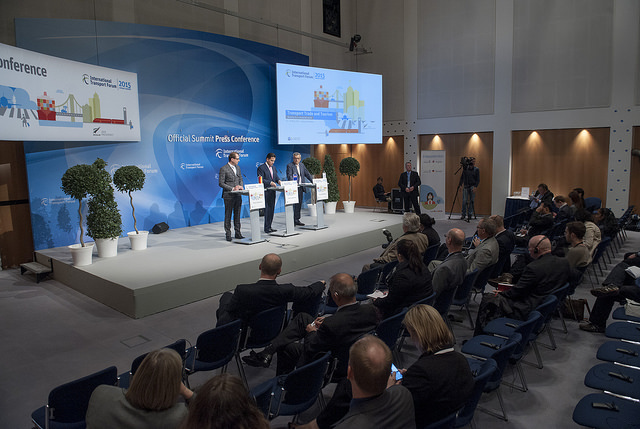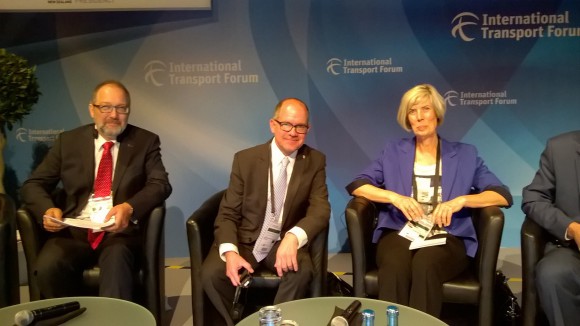
Cycling tourism in the spotlight - panel discussion with OECD and UNWTO leaders at the ITF
Cycling has a great place at the International Transport Forum 2015 Annual Summit: it was mentioned more than ever. Cycling is an engine for sustainable tourism but it could do more if it would be integrated in financing, planning and in monitoring.
 Flickr/International Transport Forum
Flickr/International Transport Forum
In addition to increased mention of cycling at a really high level, cycling tourism is also on the agenda at the International Transport Forum (ITF) 2015 Annual Summit. Tourism is one of the key themes of this year's annual summit and there is a special focus on sustainable tourism. Transport systems and services themselves can be at the heart of tourist activities. This includes sustainable tourism based around walking and cycling. In this context, Switzerland and Germany have become international references for promoting cycling.
Cycling tourism: 5 million cycling tourists in Germany alone
At a panel session focusing on the role of transport in sustainable tourism growth Raimund Jennert, Deputy Chairman of ECF's German member ADFC said that last year 5 million Germans took cycling holidays. He mentioned proudly that ADFC is the biggest cyclists’ advocacy organization that was one of the founding member of ECF and the last year in Australia launched World Cycling Alliance. “Switzerland was a good example for Germany. Now Germany is very successful in cycling tourism. We have e.g. 12 national long distance cycle routes as part of the D-Routes and 7 of them are part of the EuroVelo network.” A problem is in his opinion that not the national government but only the local authorities are responsible for their part of a national long distance route. A good example of a new development is for him the fast cycle route the Land Nordrhein Westfalen builds in het Ruhrgebiet. “This is a good example of the fact that you can merge daily commuting and touristic cycling.” Jennert’s final statement and call on authorities:”Cycling will raise! Integrate it in financing, planning and in monitoring!”
Concrete offers for cycling work!
Lukas Stadtherr, EuroVelo Council member and project management board member at SwitzerlandMobility Foundation stated that there is no need to "educate" tourists to be environmentally responsible. "But concrete offers for cycling and hiking work", he added. Mr Stadtherr also highlighted that Swiss communities do cooperate to co-finance green infrastructure which is also a key point in developing cycling infrastructure. The success of SwitzerlandMobility is due to 90 percent public funding and 10 percent from the private sector – in the beginning! Now it is 40 percent public / 60 percent private!”, he stressed.
The head of OECD’s Tourism Unit Alain Dupeyras underlined that cyclists are good spenders for local economies.
 ECF/Panel session on the role of transport in sustainable tourism growth at the ITF summit
ECF/Panel session on the role of transport in sustainable tourism growth at the ITF summit
ECF’s Secretary General Bernhard Ensink followed the panel discussion live in Leipzig. He thanked in his intervention the ITF organisation for taking cycling tourism into the session. “People travel to other countries and continents. That’s a fact. Good cycling tourism offers, e.g. from the European continent, marketed well, offer people to have a sustainable holiday in the country or on the continent they explore.” Catching up with the remark from Alain Dupeyras, that OECD monitors how ministries have tourism integrated in their policies, Bernhard Ensink emphasized that ECF on the EU level advocates for "cycling in all policies".
More European, national level coordination and public transport connections with bikes are needed
ECF has long been stressing the need to coordinate, motivate the actions of different stakeholders in the transport, tourism sector in order to be successful and to reach the economic benefits from sustainable tourism. Currently NGOs are doing the job of governmental bodies often without any support from the public side. The national level should go beyond co-ordination, they should take responsibility for national cycle route networks.
In addition, national and European level of recognition and sustainable financial support of travel, tourism industry is needed and well-functioning public transport connections with bikes are a must to reach growth in tourism. European and national authorities should make public transport connections with bikes obligatory so there would be more customers and this would make tourism more sustainable.
About the authors

 Dr Bernhard Ensink & Adam Bodor
Dr Bernhard Ensink & Adam Bodor
Dr Bernhard Ensink is ECF's Secretary General and Velo-city Series Director and Adam Bodor is Director for EuroVelo, Cycling Tourism & Regional Policy.
- Log in to post comments
Contact the author
Recent news!
Upcoming events
Contact Us
Avenue des Arts, 7-8
Postal address: Rue de la Charité, 22
1210 Brussels, Belgium









